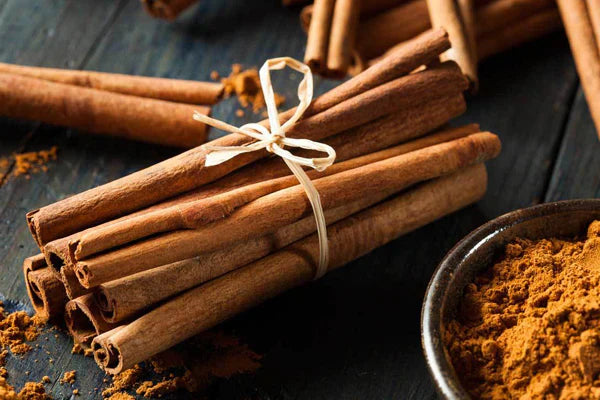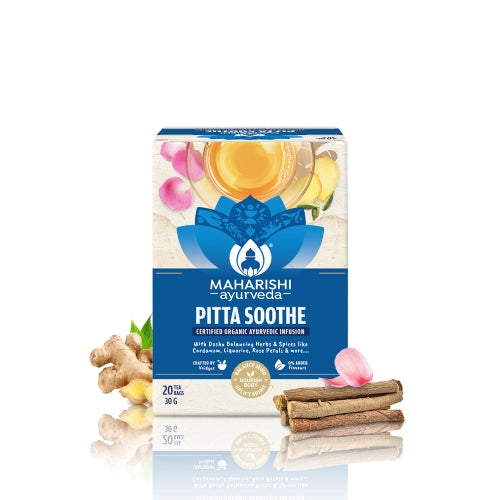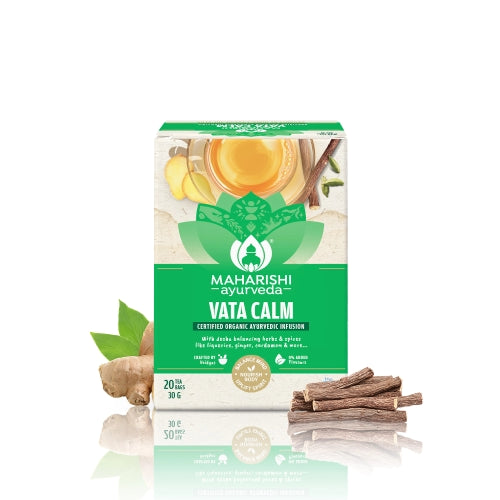Benefits of Cinnamon Sticks in Ayurveda: Health & Healing

Cinnamon, known as Dalchini in India and Twak in Ayurveda, is one of the most powerful and commonly found kitchen ingredients. The distinctive flavor and fragrance of cinnamon make it a delight, used in various culinary as well as medicinal purposes. Ayurveda has recognized the benefits of cinnamon sticks for thousands of years, using them as a natural remedy to restore balance, improve digestion, and boost immunity.
Rich in antioxidants, antimicrobial compounds, and anti-inflammatory agents, cinnamon is considered one of the best spices for holistic wellness. To extract all the goodness of this spice, soaking cinnamon sticks in water and it is used in our cuisines and for some conditions can be used for i drinking water. This traditional practice highlights the benefits of drinking cinnamon water, a time-tested Ayurvedic habit for immunity and vitality.
TL;DR – Cinnamon (Dalchini): The Ayurvedic Power Spice
- Ayurvedic Essence: Known as Twak, cinnamon balances Vata and Kapha, boosts Agni (digestion), and supports circulation and immunity.
- Rich in Antioxidants: Contains 40+ compounds that protect cells, fight aging, and lower inflammation and oxidative stress.
- Manages Sugar & Heart Health: Helps improve insulin sensitivity, lower cholesterol, and maintain healthy blood pressure.
- Daily Use & Benefits: 1–3 g daily or cinnamon water in the morning supports metabolism, relieves bloating, and strengthens the immune system.
- Precaution: Prefer Ceylon cinnamon for safety; avoid excess Cassia due to coumarin. Use moderately during pregnancy and monitor sugar levels.
What is Cinnamon in Ayurveda?
In Ayurveda, cinnamon (Twak) is classified as a warming spice that balances Vata and Kapha doshas, while mildly stimulating Pitta dosha. It is widely used to ignite Agni (digestive fire), reduce Ama (toxins), and promote overall circulation.
There are two main types of cinnamon:
-
Ceylon Cinnamon (Cinnamomum verum) – also called “true cinnamon,” it is light, sweet, and preferred in Ayurveda due to its low coumarin content.
-
Cassia Cinnamon – darker, stronger, and widely available, but higher in coumarin; should be consumed in moderation.
Understanding what is cinnamon and its Ayurvedic classification is essential for reaping maximum benefits while avoiding side effects.
Power pack antioxidant
Cinnamon is loaded with protective antioxidants that reduce free radical damage and slow downs the ageing process. Studies show that cinnamon contains over 41 different protective compounds, making it a powerhouse against oxidative stress.
These cinnamon health benefits include:
-
Preventing nitric oxide build-up in the blood
-
Reducing fat peroxidation (linked to brain disorders, cancer, and heart disease)
-
Supporting tissue repair and cellular health
This makes cinnamon one of the most potent Ayurvedic spices for anti-ageing and longevity.
Relieves Inflammation
Consumption of cinnamon could reduce both systemic inflammation and arthritis pain and headaches. The antioxidants present in the spice help lower down the risk of heart disease, cancer, etc. Types of flavonoids are found in cinnamon which effectively fights with inflammation levels throughout the body.
This benefit of cinnamon also makes it valuable for athletes, the elderly, and those struggling with muscle soreness or age-related pain.
Effective in treating type 2 diabetes
The body’s cells become resistant and do not respond properly to insulin, causing glucose to accumulate in the bloodstream. There is no cure found for this metabolic disease, cinnamon is an important key ingredient to manage its symptoms. Cinnamon forces the muscle cells to remove sugar from the bloodstream where it is converted to energy. The non-toxic cinnamon repairs the receptors so that they become responsive to insulin and the level of sugar becomes normal.
Menstrual cramps
Drinking a warm cup of dalchini water daily may help reduce menstrual cramps and discomfort. Cinnamon also helps regulate hormones, supports menstrual balance, and may improve male fertility by enhancing sperm quality.
This highlights one of the lesser-known yet powerful benefits of eating cinnamon in reproductive health.
Takes care of heart
Among the top cinnamon benefits is its ability to strengthen the heart. Cinnamon helps:
-
Lower bad cholesterol (LDL)
-
Reduce triglycerides
-
Balance blood pressure
-
Support tissue repair in the heart
By addressing these risk factors, cinnamon plays a role in preventing heart attacks, strokes, and other cardiovascular conditions.

Boosts Immunity & Respiratory Health
Ayurveda recognizes cinnamon as an immune-boosting spice. Its warming nature clears mucus, relieves nasal congestion, and supports respiratory conditions like cough and bronchitis.
The health benefits of cinnamon for immunity come from its flavonoids and polyphenols, which protect against infections and strengthen defense mechanisms.
Help to fight the HIV virus
This highlights the broader cinnamon health benefits in supporting the body’s fight against infections and viruses.
Provides relief in allergic conditions
The antibiotic and antimicrobial property helps protect the skin from irritation, rashes, allergic reactions, infections and redness.
This is one of the versatile uses of cinnamon beyond culinary purposes.
Supports Brain Health & Memory
Neurotrophic factors increase if you consume cinnamon, it helps existing neurons in your brain to live and encourage new ones to grow. It boosts brain function and helps in preventing the development of neurological disorders like Parkinson’s and Alzheimer’s. Cinnamon helps block the build-up of a specific protein called tau in the brain to reduce the risk of Alzheimer’s disease. It also protects neurons from the oxidative stress to reduce the risk of inflammation and damaging of cells.
Cinnamon is one of the most delicious and highly aromatic spices used to add flavour and aroma in dishes. However, it has exceptional medicinal properties, packed with antioxidants, ready to fight against the damaging agents preventing them to harm your body.
Digestive & Detox Benefits
Cinnamon is well known in Ayurveda for stimulating Agni (digestive fire), reducing bloating, easing indigestion, and improving nutrient absorption. It also acts as a mild diuretic, supporting kidney function and detoxification.
These digestive benefits of cinnamon sticks make them an everyday wellness essential.
Dosage & How to Use Cinnamon
-
Daily intake: 1–3 g (½ to 1 tsp) of cinnamon powder is considered safe.
-
Dalchini water: Soak a stick overnight and drink in the morning.
-
Tea: Boil with water, add honey for throat and digestion.
-
With ghee: Enhances nutrient absorption and boosts digestion.
The benefits of drinking cinnamon water regularly include improved metabolism, better immunity, and reduced inflammation.
Safety & Precautions
While cinnamon offers countless cinnamon health benefits, moderation is key:
-
Prefer Ceylon cinnamon for regular use.
-
Excess Cassia cinnamon may cause liver issues due to high coumarin.
-
High doses may irritate the mouth or stomach.
-
Diabetic patients should monitor sugar levels to avoid hypoglycemia.
-
Pregnant women should use cinnamon cautiously, as high amounts may affect uterine activity.
Conclusion
Cinnamon is not just a flavorful spice—it is a complete Ayurvedic medicine for modern lifestyles. From boosting immunity and improving heart health to supporting digestion, metabolism, and brain function, the benefits of cinnamon are truly holistic.
Adding a small amount of this best spice to your daily routine, especially through benefits of dalchini water, can help you achieve balance, wellness, and longevity.
FAQs
1. What is the benefit of cinnamon in Ayurveda?
Cinnamon balances Vata and Kapha doshas, stimulates digestion, supports immunity, and promotes heart and brain health.
2. What are the benefits of drinking cinnamon water daily?
Dalchini water boosts metabolism, reduces bloating, regulates blood sugar, and strengthens immunity.
3. Which type of cinnamon is best for health?
Ceylon cinnamon (true cinnamon) is considered the best and safest for daily consumption.
4. How much cinnamon should I eat daily?
For daily use one should use in meals , Therapeutic dose- 1 to 3gm, cinnamon drops - 2 to 5 drops is safe and effective for most adults.
5. Are there any side effects of cinnamon?
Excess Cassia cinnamon may affect the liver due to coumarin. Pregnant women and should consume with caution.
Popular Posts

Milk Tea vs Caffeine-Free Herbal Teas: Which Is Better for Your Health
11 Feb, 2026As early as the 1st century BC, Ayurvedic physician Charaka explains why kasaya – herbal decoctio...
Read more
The Quiet Power of Agni: Why Your Digestion Decides Everything
09 Feb, 2026What Is Agni in Ayurveda? (Understanding Digestive Fire) In Ayurveda, ‘agni’ refers to metabol...
Read more
How Ayurveda Explains the Gut and Immunity Connection
06 Feb, 2026What Is Gut Health? When we ask what is gut health, Ayurveda points towards colon or pakvāśaya...
Read more






 Popular Read
Popular Read

















































